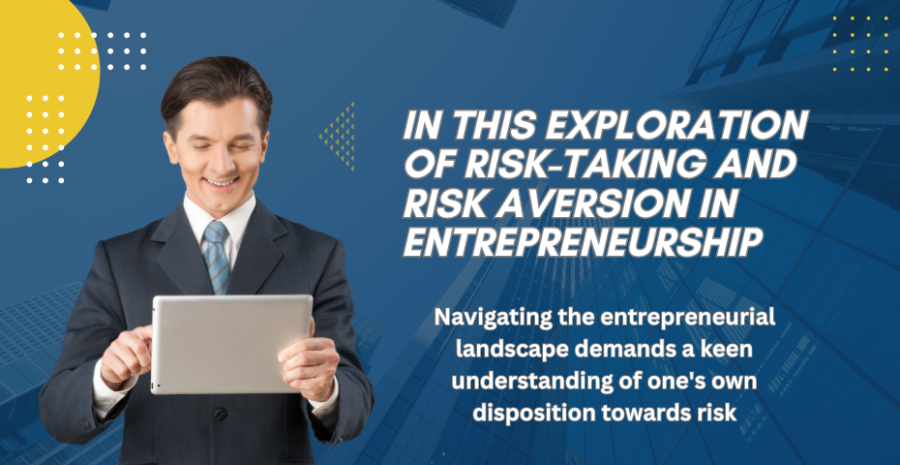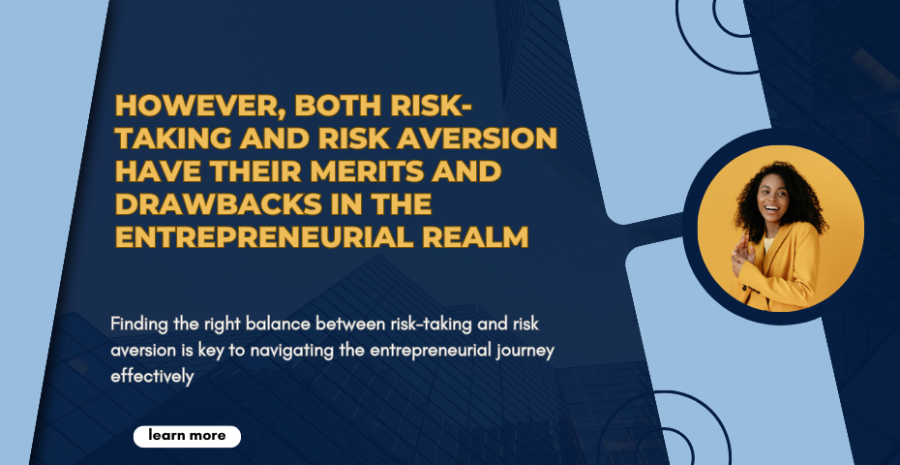
Risk-Taker or Risk-Averse: Navigating Entrepreneurial Personality Traits
.png)
Navigating the entrepreneurial landscape demands a keen understanding of one's own disposition towards risk. In the realm of entrepreneurship, individuals often fall along a spectrum, ranging from risk-takers who embrace uncertainty with gusto to the risk-averse who tread cautiously, prioritizing stability and security. This fundamental duality in entrepreneurial personality traits underscores the diverse approaches individuals adopt when venturing into the world of business.
For some, the allure of bold innovation and the thrill of challenging conventions drive them to take calculated risks in pursuit of their entrepreneurial dreams. Conversely, others approach entrepreneurship with a more cautious mindset, meticulously weighing the potential pitfalls and seeking to mitigate uncertainties before making decisive moves. Understanding where one falls on this continuum is pivotal, as it shapes not only the strategies employed but also the attitudes towards failure, success, and the journey itself.

In this exploration of risk-taking and risk aversion in entrepreneurship, we delve into the nuances of each trait, offering insights and strategies to navigate the entrepreneurial path effectively, regardless of one's predisposition towards risk.
Navigating the entrepreneurial landscape demands a keen understanding of one's own disposition towards risk. In the realm of entrepreneurship, individuals often fall along a spectrum, ranging from risk-takers who embrace uncertainty with gusto to the risk-averse who tread cautiously, prioritizing stability and security. This fundamental duality in entrepreneurial personality traits underscores the diverse approaches individuals adopt when venturing into the world of business.
For some, the allure of bold innovation and the thrill of challenging conventions drive them to take calculated risks in pursuit of their entrepreneurial dreams. These risk-takers are often characterized by their willingness to dive headfirst into uncharted territories, fueled by a vision that outweighs the fear of failure. They thrive in environments of ambiguity, viewing obstacles as opportunities for growth and learning.
Conversely, others approach entrepreneurship with a more cautious mindset, meticulously weighing the potential pitfalls and seeking to mitigate uncertainties before making decisive moves. These risk-averse individuals are driven by a desire for stability and security, preferring to minimize exposure to potential losses and prioritize incremental progress over radical leaps.
Understanding where one falls on this continuum is pivotal, as it shapes not only the strategies employed but also the attitudes towards failure, success, and the journey itself. Risk-takers may view failure as a natural part of the entrepreneurial process, embracing setbacks as valuable learning experiences that propel them forward. In contrast, risk-averse individuals may be more risk-averse, viewing failure as a deterrent and seeking to avoid it at all costs.

However, both risk-taking and risk aversion have their merits and drawbacks in the entrepreneurial realm. While risk-takers may achieve rapid growth and innovation, they also face heightened exposure to failure and financial instability. On the other hand, risk-averse individuals may enjoy greater stability and security, but may also miss out on opportunities for growth and expansion.
Finding the right balance between risk-taking and risk aversion is key to navigating the entrepreneurial journey effectively. This requires a nuanced understanding of one's own risk tolerance, as well as the ability to adapt and pivot in response to changing circumstances. Moreover, it entails a willingness to embrace discomfort and uncertainty, recognizing that growth often occurs outside of one's comfort zone.
Entrepreneurial success hinges on the ability to leverage one's unique strengths and traits, whether they lean towards risk-taking or risk aversion. By harnessing the strengths of each approach and mitigating their respective weaknesses, individuals can forge a path that aligns with their goals and aspirations. Moreover, cultivating a diverse team with complementary traits can enhance decision-making and resilience, ensuring a well-rounded approach to entrepreneurship.
Ultimately, whether one is a risk-taker or risk-averse, navigating the entrepreneurial landscape requires resilience, adaptability, and a relentless pursuit of one's vision. By embracing the inherent challenges and uncertainties of entrepreneurship, individuals can chart a course towards success that reflects their unique strengths and values.
Determining whether you possess the entrepreneurial spirit involves a combination of self-reflection and observation of your behaviors and inclinations. Here are several indicators that suggest you may have what it takes to be an entrepreneur:
1.Passion and Vision:

You have a clear vision for an idea, product, or service that excites you and ignites your passion. Your enthusiasm for your vision drives you to pursue it relentlessly.
Passion and vision are the driving forces behind every successful entrepreneur. Your passion fuels your commitment and dedication to your goals, motivating you to overcome obstacles and pursue your vision relentlessly. Without passion, the challenges of entrepreneurship can quickly become overwhelming, making it essential to have a genuine enthusiasm for your work.
Your vision provides the roadmap for your entrepreneurial journey, guiding your decisions and actions towards a clear destination. It serves as a beacon of inspiration, inspiring you to push boundaries, innovate, and create positive change in the world. Moreover, your vision acts as a magnet, attracting like-minded individuals who share your passion and are drawn to your purpose-driven mission. In essence, passion and vision are the foundation upon which entrepreneurial success is built, driving you forward on your path to making a meaningful impact
2. Problem-Solving Orientation:

You naturally identify problems or inefficiencies in your environment and feel compelled to develop innovative solutions to address them.A problem-solving orientation is a hallmark trait of successful entrepreneurs, as it empowers them to identify challenges as opportunities for innovation. Entrepreneurs with this mindset possess a keen ability to analyze complex problems, break them down into manageable components, and devise creative solutions. They are adept at thinking outside the box and approaching problems from multiple perspectives, often uncovering unconventional pathways to success.
Moreover, their problem-solving orientation fosters a culture of continuous improvement and adaptation, as they are always seeking ways to optimize processes and enhance efficiency. This orientation also instills confidence and resilience, as entrepreneurs view setbacks not as failures but as valuable learning experiences that inform future decisions. Ultimately, a problem-solving orientation enables entrepreneurs to navigate the ever-changing landscape of business with agility and ingenuity, positioning them for long-term success and growth.
3. Risk Tolerance:
You are comfortable with uncertainty and are willing to take calculated risks to pursue opportunities, even if it means stepping outside of your comfort zone.
Risk tolerance is a critical factor that distinguishes entrepreneurs, as it reflects their willingness to embrace uncertainty and venture into uncharted territory. Entrepreneurs with a high risk tolerance are comfortable with ambiguity and are willing to take calculated risks in pursuit of their goals. They understand that success often requires stepping outside of their comfort zone and are undeterred by the possibility of failure. However, risk tolerance does not equate to recklessness; rather, it involves carefully evaluating potential risks and rewards and making informed decisions based on thorough analysis.
Entrepreneurs with a healthy risk tolerance understand that failure is an inevitable part of the entrepreneurial journey and are resilient in the face of setbacks. Moreover, they recognize that risk-taking is essential for innovation and growth, as it opens up new opportunities and challenges the status quo. Ultimately, risk tolerance is a key driver of entrepreneurial success, enabling individuals to seize opportunities and realize their full potential.
4. Initiative and Proactivity:

You are proactive in seeking out opportunities and taking action to make things happen, rather than waiting for them to come to you.
Initiative and proactivity are fundamental traits that propel entrepreneurs towards success. Individuals who exhibit these qualities are self-starters, taking the initiative to identify opportunities and proactively pursue them. They do not wait for permission or direction but instead take ownership of their goals and actively seek out ways to achieve them. Entrepreneurs with a strong sense of initiative are quick to spot gaps in the market or inefficiencies in existing systems, and they are eager to capitalize on these opportunities.
Moreover, their proactive approach enables them to stay ahead of the curve, anticipating trends and adapting their strategies accordingly. Initiative and proactivity are also infectious qualities that inspire others to take action and rally behind a common vision. By demonstrating these traits, entrepreneurs not only drive their own success but also foster a culture of innovation and progress within their teams and organizations.
5. Resilience:
You have a high tolerance for failure and setbacks, viewing them as opportunities for growth and learning rather than insurmountable obstacles. Resilience is the backbone of every successful entrepreneur, enabling them to weather the inevitable storms of the entrepreneurial journey. In the face of challenges, setbacks, and failures, resilient entrepreneurs display unwavering determination and perseverance. They bounce back from adversity with renewed vigor, using setbacks as opportunities for growth and learning. Resilient entrepreneurs maintain a positive attitude and mindset, even in the face of daunting obstacles, believing that every challenge presents an opportunity for improvement.
Moreover, their resilience allows them to adapt to change and pivot when necessary, rather than being paralyzed by fear or uncertainty. Resilience also fosters a sense of grit and tenacity, empowering entrepreneurs to push through obstacles and stay focused on their long-term goals. Ultimately, it is the resilience of entrepreneurs that enables them to turn setbacks into stepping stones and transform challenges into triumphs.
6. Adaptability:
.png)
You are flexible and adaptable, able to pivot and adjust your approach in response to changing circumstances or feedback. Adaptability is a cornerstone trait of successful entrepreneurs, allowing them to thrive in dynamic and unpredictable environments. Entrepreneurs who are adaptable embrace change as a natural part of the entrepreneurial journey, remaining flexible and open-minded in the face of shifting circumstances. They are quick to pivot their strategies and tactics in response to new information or market trends, rather than being wedded to a rigid plan.
Adaptability enables entrepreneurs to seize opportunities as they arise and capitalize on emerging trends, giving them a competitive edge in the marketplace. Moreover, adaptable entrepreneurs are adept at navigating uncertainty and ambiguity, maintaining their composure and focus even in turbulent times. Their ability to adapt fosters resilience and agility, empowering them to overcome obstacles and emerge stronger than before. Ultimately, adaptability is a key driver of entrepreneurial success, enabling individuals to thrive in an ever-changing landscape and capitalize on the opportunities that lie ahead.
7. Independence and Autonomy:

You thrive in environments where you have the freedom to make your own decisions and chart your own course. Independence and autonomy are foundational characteristics of entrepreneurs, driving their ability to chart their own course and pursue their vision without external constraints. Entrepreneurs value the freedom to make their own decisions and take ownership of their successes and failures. They are self-reliant individuals who trust in their abilities to navigate challenges and seize opportunities.
Independence allows entrepreneurs to break free from the limitations of traditional structures and embrace innovative approaches to problem-solving. Moreover, autonomy empowers entrepreneurs to align their actions with their values and priorities, rather than being dictated by external forces. Entrepreneurs cherish the opportunity to create something of their own, forging their path in pursuit of their dreams. Ultimately, independence and autonomy fuel the entrepreneurial spirit, inspiring individuals to push boundaries, challenge conventions, and leave their mark on the world.
8. Creativity and Innovation:
You are creative and resourceful, constantly generating new ideas and finding innovative ways to solve problems or meet needs. Creativity and innovation are the lifeblood of entrepreneurship, driving individuals to think outside the box and push the boundaries of what is possible. Entrepreneurs with a creative mindset are adept at generating novel ideas and approaches to solving problems. They thrive in environments that encourage experimentation and embrace failure as a natural part of the creative process.
Innovation fuels entrepreneurship by fostering the development of new products, services, and business models that disrupt industries and create value. Moreover, creative entrepreneurs are skilled at recognizing opportunities where others see obstacles, transforming challenges into opportunities for innovation. Their ability to think creatively enables them to differentiate themselves in crowded markets and capture the attention of customers. Ultimately, creativity and innovation are essential traits that empower entrepreneurs to envision a better future and bring their ideas to life.
9. Networking and Relationship-Building Skills:

You are skilled at building and nurturing relationships, recognizing the importance of networking and collaboration in achieving your goals. Networking and relationship-building skills are invaluable assets for entrepreneurs, facilitating opportunities for collaboration, growth, and support. Entrepreneurs who excel in networking understand the importance of building genuine connections with others in their industry and beyond. They actively seek out opportunities to expand their network, attending events, joining professional organizations, and leveraging social media platforms to connect with like-minded individuals.
Effective relationship-building skills enable entrepreneurs to cultivate strong partnerships and alliances, opening doors to new opportunities and resources. Moreover, strong relationships foster a sense of trust and credibility, enhancing the entrepreneur's reputation and influence within their community. Entrepreneurs who prioritize networking and relationship-building create a robust support system, comprised of mentors, advisors, and peers who provide guidance and encouragement along their journey. Ultimately, networking and relationship-building skills are essential tools that empower entrepreneurs to navigate the complexities of entrepreneurship and achieve their goals.
10. Persistence:
You possess a tenacious spirit and are willing to persevere through challenges and setbacks, refusing to give up on your dreams. Persistence is the unwavering commitment that propels entrepreneurs forward in the face of challenges and setbacks. Entrepreneurs who embody persistence possess a resolute determination to pursue their goals with relentless dedication. They refuse to be deterred by failure, setbacks, or criticism, viewing each obstacle as an opportunity to learn and grow.
Persistence enables entrepreneurs to maintain focus and momentum, even when the path ahead seems daunting or uncertain. Moreover, persistent entrepreneurs exhibit a never-give-up attitude, willing to put in the hard work and effort required to overcome obstacles and achieve success. Their resilience in the face of adversity inspires confidence and trust in their ability to deliver results. Ultimately, persistence is the driving force that separates successful entrepreneurs from those who falter along the way.
11. Leadership Abilities:

You have a natural ability to inspire and motivate others, rallying people around your vision and guiding them towards a common goal. Leadership abilities are essential for entrepreneurs to inspire, motivate, and guide their teams towards shared goals. Effective leaders possess a clear vision and communicate it with conviction, rallying others around a common purpose. They lead by example, demonstrating integrity, authenticity, and accountability in their actions and decisions.
Moreover, effective leaders empower their teams, fostering a culture of trust, collaboration, and innovation. They recognize and leverage the unique strengths of each team member, maximizing collective potential and driving results. Additionally, strong leaders are adept at navigating challenges and conflict, facilitating constructive dialogue and finding solutions that benefit the entire team. Ultimately, leadership abilities are critical for entrepreneurs to cultivate a high-performing team and achieve sustained success in their ventures.
12. Entrepreneurial Experience:
You may have previous experience starting or running your own business, or you may have demonstrated entrepreneurial tendencies in other aspects of your life, such as hobbies or volunteer work. Entrepreneurial experience provides invaluable insights and lessons that shape an individual's approach to business and decision-making. Entrepreneurs who have prior experience understand the nuances of building and scaling a business, having navigated the challenges and triumphs firsthand.
Their experience equips them with a deep understanding of market dynamics, customer behavior, and industry trends, enabling them to make informed decisions and mitigate risks effectively. Moreover, entrepreneurial experience fosters resilience and adaptability, as entrepreneurs have learned to pivot and innovate in response to changing circumstances. Additionally, seasoned entrepreneurs have honed their networking and relationship-building skills, leveraging their connections and resources to drive growth and expansion.
Furthermore, entrepreneurial experience instills confidence and credibility, as entrepreneurs draw upon their past successes and failures to inspire trust and confidence in their stakeholders. Ultimately, entrepreneurial experience is a valuable asset that empowers individuals to navigate the complexities of entrepreneurship with confidence and agility.
While possessing these traits and experiences can indicate a propensity for entrepreneurship, it's important to remember that entrepreneurship is a journey, and success often requires a combination of passion, hard work, and perseverance over time.
.jpg)
About: Andries vanTonder
Over 40 years selfemployed
He is a Serial Entrepreneur, an Enthusiastic supporter of Blockchain Technology and a Cryptocurrency Investor
Find me: Markethive Profile Page | My Twitter Account | My Instagram Acount | and my Facebook Profile.
